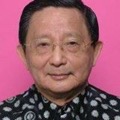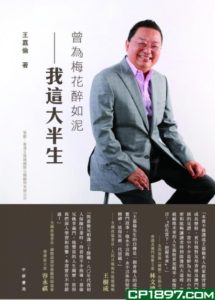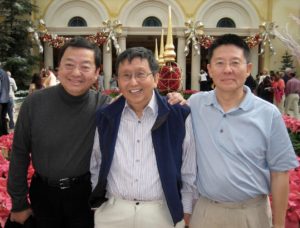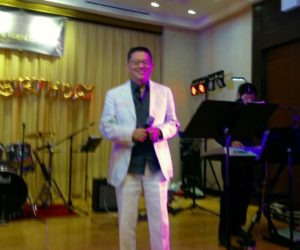Dr. Paul T. P. Wong’s autobiography, A Lifelong Search for Meaning: Lessons on Virtue, Grit, and Faith, is published in weekly installments. Stay updated here.
All my younger brothers have fared much better than my older siblings. They have surprised me with their achievements and financial success. Maybe it is a matter of being born in a better historical period; maybe it is because they have learned valuable lessons from the failures of the two oldest brothers.
Constant Wong (王载熙): A Genius Inventor
 Constant is only one year younger. Therefore, we spent a lot of time together, especially during our high school days. We shared many interests, such as adventures in nature and English poetry.
Constant is only one year younger. Therefore, we spent a lot of time together, especially during our high school days. We shared many interests, such as adventures in nature and English poetry.
After graduating from high school, Constant worked in the post office, at the same time as when I was employed at the Peak Police Station as an interpreter. One day at work, I received an emergency phone call from our mother that he was arrested for “stealing stamps.”
When I went to bail Constant, he was pretty shaken up and his face was very pale. According to his account, he was only guilty of lifting several stamps off incoming mail from foreign countries. One of his colleagues must have reported him. I wonder how this traumatic experience has affected him and whether it has embittered him towards life.
Shortly after, I went abroad to study in Canada; Constant also went to abroad, but to Australia to study English literature, later going on to receive his Ph.D. from Melbourne University. He stayed on to teach at Melbourne and published a collection of poetry. He continues to publish poems online.
Disillusioned with the dirty politics of university administration, Constant later gave up his academic career. I do not know exactly what he did after quitting his teaching job, but I learned from our mother that he was struggling financially. Indeed, when I met him at my father’s funeral in Hong Kong, he really did not look too good, with long unkempt hair, rotten teeth, and a worn-out suit.
However, Constant was a genius who still had his dignity and self-confidence in spite of being down on his luck.
Let me explain why. Constant did not excel in high school because he had too many outside interests. He only took one math course in university and had no computer science background. Yet, he became an inventor.
According to his own account, in the early 80s, there were no systems that allowed him to input Chinese characters quickly. So, he decided to develop one himself. He decided to self-learn all the mathematics and computer science needed to complete this project.
After 15 years of struggle, he produced and patented a Chinese computer keyboard in 1999 (WO 2000025197 A1). His invention has been described as so:
An innovator of the highest magnitude, Dr. Wong is also the inventor of a Chinese computer keyboard that is capable of inputting any of the 20,000 Chinese characters, both simplified and traditional, with a maximum of four keystrokes. In addition, he invented the Ten-keyed keypad, which is an input system for mobile phones that allows the user to reduce the number of keystrokes needed for a word by an average of two-thirds. (“Dr. Constant Wong,” 2013)
During these 15 years, he also showed his talent in raising enough venture capital to support research and development. According to my best knowledge, his invention was sold to a Chinese investor for 10 million US—but it was never marketed to avoid competition with other input systems invented in China.
But his creativity did not end there. After his initial success, he has been working on a much more ambitious project of developing recursive lossless data compression technology capable of fast transmission of visual images. He completed this project in 2012 according to the press release (Leong, 2012). In my latest communication with him this year (2017), he has just finished a major update to further increase the speed of data compression. His invention has been said to be thus:
Employing his extensive experience and expertise in the field, Dr. Wong serves as Chairman and Managing Director of Recursive Digital Management, through which he has invented Recursive Lossless Compression, which is a digital data compression technology that can compress any kind of data repeatedly until it reaches maximum capacity with no data loss. It is the first compression technology of its kind and the only one proven to achieve true recursive compression. (“Dr. Constant Wong,” 2013)
Who says that people over 70 years of age can no longer be creative? Who says that nowadays one cannot do scientific innovation without a science degree? My brother has proven that he can accomplish the impossible despite the lack of any formal scientific training and university support.
All the computer science experts he consulted dismissed his idea of recursive lossless data compression! That did not deter him from forging ahead with his dream. He is truly a Renaissance man who excels in both the arts and science.
Constant’s tenacity is also evident in his success in pushing back aging. In his 70s, he can still do 100 push-ups! He claims that he is stronger and healthier now than when he was 30. This is the result of his disciplined physical training. What an amazing guy!
My own regret is that our relationship has become distant because of over half a century of separation. We have not been able to have a good reunion since my father’s funeral. I wish him continued success.
Giles Wong (王载和): A Brilliant Businessman
Next to Constant is Giles. He was born in the year of the dragon (1940), the most favoured son of our father. I still cannot fully understand the reason for this favouritism, which caused a great deal of unnecessary pain during our childhood. Whenever there was any conflict among the siblings, he would get us into trouble by complaining to our father as soon as he came home from work. Then, our father would automatically hit us without finding our side of the story. As a result, Giles was not well liked by his siblings.
I never got to know him well, and none of the siblings were able to get close to him. My impression was that he was quite content being by himself, doing his own things. When he became an adult, he adopted the same philosophy of “You don’t bother me; I don’t bother you.”
He studied at the University of Hawaii and became a chartered accountant. After graduation, he settled there and married a beautiful model. Later, he returned to Hong Kong only after Father invited him to partner with him in his marble import business, with the promise of passing on the entire business to him after his retirement.
Since I lived in Canada, I did not know the details of why and how the relationship between Father and Giles deteriorated to the point of no longer speaking to each other. From what I can gather, Father eventually sold the business to him, but later complained that Giles paid him way under the market value, when he saw the marble business really take off. I believe that the underlying problem is more than a financial one, because Father originally planned to hand over the business to his favourite son.
What an irony of fate! No one could have predicted that their relationship would turn out so badly. It must have broken Father’s heart to have his own favourite son turn against him. It also must have been traumatic for Giles when Father filed a lawsuit against him; this was settled out of court, when Giles paid Father another sum of money for the business.
It is very sad that Giles did not even attend Father’s funeral. He also refused to accept his share of the inheritance. After Father’s death, Giles was happy to renew his relationship with Mother—visiting her regularly and treating her very well with gifts and financial support.
Giles is a very smart businessman. He not only expanded the marble import business, he also started to produce Italian maple furniture for local consumption in Hong Kong and China. He had two factories, one in Hong Kong and one in China.
But his stroke of genius came when he took advantage of the property crash of 1997 when Hong Kong was taken over by Communist China—real estate value dropped by almost 70%! He bought several storefronts in the busiest business districts in Hong Kong and Kowloon. He became very wealthy as a result of these investments, when Hong Kong business properties eventually not only recovered but also skyrocketed in value.
Despite his wealth, Giles remained a very private man and lived a simple life of routines. He would regularly go to work and patronize the same restaurants for different meals. For example, he had a special table in a spot reserved just for him for afternoon tea, whether he showed up or not.
During my visits to Hong Kong, I learned that he spent his leisure time reading philosophy and spiritual books, such as Tibetan Book of the Dead. He seldom went out with his wife, saying that she was happy as long as she had money to go shopping.
I lost touch with him after Mother’s death. None of us knows how he is doing and where he is living. I just wish him well and hope that I can see him again.
Joshua Wong (王载胜 alias 王嘉倫): A Legend in the Insurance Industry
 The greatest surprise is Joshua. We used to call him “Ha Ha” because he was only able to make “Ha Ha” sounds, when other children of his age were already speaking. He also did not do well in school. I still feel very bad for throwing a book at him and calling him “stupid” because he could not do his homework.
The greatest surprise is Joshua. We used to call him “Ha Ha” because he was only able to make “Ha Ha” sounds, when other children of his age were already speaking. He also did not do well in school. I still feel very bad for throwing a book at him and calling him “stupid” because he could not do his homework.
Father was especially harsh in his judgement of Joshua. He totally dismissed him as useless and without a future ( 不成器; 沒有出息). He told Joshua to his face: “I will never depend on you when I get old.” Unfortunately, Father had to eat his own words, because in his old age, the only son that had the means and the heart of take care of him was none other than Joshua!
His “from rags-to-riches” story can be found in his two books, Footprints (脚印) (2007) published by Sun Yat-Sen University Press and his autobiography (曾为梅花醉如泥) (2014). His autobiography has been serialized in a major newspaper in Hong Kong, Wen Wei Po (文匯報) (“Ceng wei meihua zui ru ni,” 2015). His remarkable life has been adapted to a 34-episode TV drama, The Glorious Moments in Life (歲月驕陽) (“Suiyue Jiaoyang,” 2009). His blog has more than 10 million followers (Wang Jialun, 2010).
Joshua is by far the most successful and famous sibling, even though he had the least formal education—he barely finished his secondary education in a no-name school. What accounts for his dramatic accomplishments? One word: suffering!
During the 1960s and early 70s, corruption was rampant in Hong Kong; it permeated every level of the Hong Kong government. As an interpreter in the court, he took his share of the corruption money.
Everything changed when the Independent Commission Against Corruption (ICAC) was formed in 1974 with a sweeping mandate to clean up the public sector. He was arrested and imprisoned, along with many other civil servants.
During his incarceration, he suffered a lot of physical abuse in the hands of other inmates. He vowed that when he got released, he would work hard and get to the top the honest way. True to his word, he read very self-help book he could lay his hands on and improved himself in every possible way.
Through my father’s recommendation, he was able to work for the American company AIA as an insurance agent. Within six years, by dint of his hard work and genius, he was able to smash all the sales records. In the past 40 years, he has captured all the top awards, both regionally and internationally. He is now widely acknowledged as the “Godfather of Insurance” in Hong Kong.
I believe that another main factor of his success was that he really knows how to relate to people. He is extremely generous and opens his wallet readily whenever any family member needs help. I have benefited greatly from his financial support of my International Meaning Conferences. He has also generously contributed to other charitable organizations, such as hospitals and cancer research.
Joshua is not only generous, but cares about other agents who work with or under him. His weekend seminar “Choice” was designed to help insurance agents to become their best through self-understanding, personal growth, emotional-regulation, and building trusting relationships. This self-help seminar was widely successful, attended by thousands of insurance agents. This training has indirectly contributed to the success of all those agents working for him.
Finally, Joshua understands the importance of meaning in life. In one of his blog entries on, he said that success without meaning cannot endure testing (成功需要被赋与某种意义. 没有意义的成功等同没有地基的建筑, 是经不起考验的) (Wang Jialun, 2010). He practices what he preaches; to him, insurance is his way of help people plan a more secure financial future. His natural warmth and genuineness instantly earn the trust of the people he works with.
His son Marcus has followed the steps of his father and grandfather by working for AIA. Marcus too has already achieved remarkable success in his young age. I am so glad that my father’s genius in the insurance industry has been passed on to Joshua and Marcus.
Oscar Wong (王载华): The Singing Lawyer
 Oscar is the only brother who lives in Toronto. I am very happy that we get together for lunch or dinner from time to time. Here is a picture of Oscar (on the left) when Joshua invited us to celebrate Christmas in Los Vegas in 2005
Oscar is the only brother who lives in Toronto. I am very happy that we get together for lunch or dinner from time to time. Here is a picture of Oscar (on the left) when Joshua invited us to celebrate Christmas in Los Vegas in 2005
Oscar’s life is the least eventful, but no less remarkable. He is exactly ten years younger than me. During his childhood, he did not have proper nutrition, yet grew up to be the most physically fit. During his university days at the University of Toronto, he placed second in Ontario in the sport of fencing. He is also very good in ping pong. Even now, reaching the age of 70, he still has the body of a young person.
Professionally, he is a practicing lawyer—one of the very few Chinese lawyers in Toronto during the 70s. According to his account, his academic and professional achievements were due to an epiphany he received when he was still in Grade 9. One day after school, on his way home, he asked himself: What will happen to me when I grow up?
As he paused and reflected on his own life, he suddenly realized that unless there was a dramatic change in him, he would be doomed to a life of poverty. At that moment, he decided to study hard and get accepted into the best and most prestigious Diocesan Boys School in Hong Kong. He was able to achieve his goal and graduated from Diocesan with flying colours.
 After that, he studied in Canada with an M.A. in History and a J.D. in law, both from the University of Toronto. His own daughter and son have also become lawyers. In addition to a thriving practice in law, he also has invested in properties in the U.S., China, and Canada.
After that, he studied in Canada with an M.A. in History and a J.D. in law, both from the University of Toronto. His own daughter and son have also become lawyers. In addition to a thriving practice in law, he also has invested in properties in the U.S., China, and Canada.
In the Chinese community in Toronto, he is widely known as the singing lawyer. That is the remarkable part of his story. He was not known for his singing ability or his love for singing, but when he approached 65, he decided to take up singing as a hobby.
Two years ago, I had the opportunity of going to his first concert, attended by a few hundred people who purchased tickets for an evening with Oscar singing eight solos. He has been singing in different functions. Lately, I have learned that he has also taken up drumming.
Conclusions
All my younger brothers have my father’s entrepreneurial spirit and talent. They also have the same determination, tenacity and risk-taking attitude. Their success is clearly due to a combination of genes and circumstances.
A big contributing factor to their remarkable achievements is that all of them have gone through some trauma. It was the experience of having overcome suffering and adversity that gave them the necessary grit and resolve to succeed against all odds.
My own contribution to their lives is twofold. First, I taught them that they must have finished their homework before they could play. Second, I set an example regarding the importance of spiritual values. Although none of them became a Christian, they have all turned out to be decent human beings with a strong sense of integrity and justice.
References
- Ceng wei meihua zui ru ni: Wang Jialun sushuo bansheng. (2015, December 23). Wen Wei Po. Retrieved from http://paper.wenweipo.com/2015/12/23/OT1512230004.htm
- Dr. Constant Wong – Product Development – Stanford Who’s Who certified. (2013, March 5). Before It’s News. Retrieved from http://beforeitsnews.com/press-releases/2013/03/dr-constant-wong-product-development-stanford-whos-who-certified-2740852.html
- Leong, D. (2012, April 27). “Recursive lossless compression of random data” now a reality. PR Web. Retrieved from http://www.prweb.com/releases/2012/4/prweb9445241.htm
- Suiyue Jiaoyang Guanfang boke [The Glorious Moments in Life Blog]. (2009). Wangyi Gongsi [Netease]. Retrieved from http://suiyuejiaoyang.blog.163.com
- Wang Jialun. (2010). Weibo. Retrieved from http://weibo.com/u/1331561275
- Wong, C. T. S. (2000). WO 2000025197 A1. Geneva, Switzerland: World Intellectual Property Organization. Retrieved from https://patentscope.wipo.int/search/en/detail.jsf?docId=WO2000025197
- Wong, J. L. (2007). Jiaoyin [Footprints]. Guangzhou, China: Sun-Yat Sen University Press.
- Wong, J. L. (2014). Ceng wei meihua zui ru ni: Wo zhe da bansheng [This is my life]. Beijing, China: Zhonghua Book Company.
